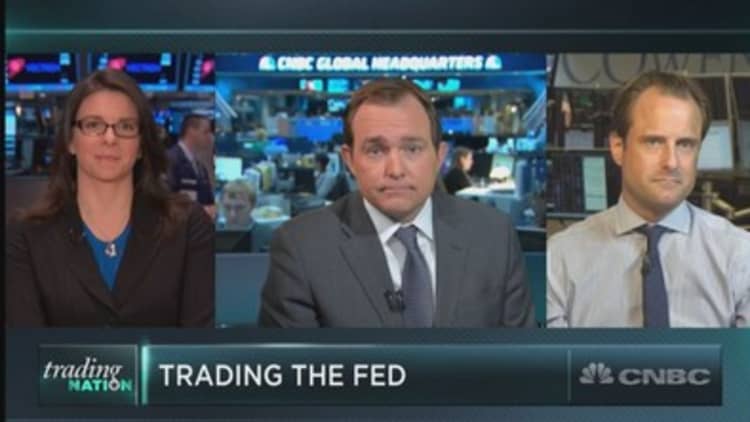
Do investors need to protect themselves in case the Fed gets less "patient?"
The much-awaited Federal Reserve meeting begins on Tuesday, and the Federal Open Market Committee statement will release its latest policy statement on Wednesday. All eyes will be on one word—"patient," as in this sentence from the Fed's January statement: "Based on its current assessment, the Committee judges that it can be patient in beginning to normalize the stance of monetary policy."
If the word goes, then the Fed would be open to raising rates within two meetings, as chair Janet Yellen informed her congressional inquisitors in late February.
But a funny thing has happened on the way to the feared major market slide: Stocks digested the potential for a less "patient" statement in stride.
"What I'm getting really impatient with is the fact that everybody's talking about the word 'patient,'" said David Seaburg, head of equity sales trading with Cowen & Co. "Everybody expects it. The market's pricing it in. So near-term, no move" should be expected off of a change to the statement.
The options market is pricing in a move of 1.7 percent for the S&P between Monday afternoon and Friday's close, said Stacey Gilbert, head of derivative strategy with Susquehanna International Group.
"That's not unusual for a Fed week. So in general, there's no extra significant volatility being priced in, as if the Fed's going to say something that's really going to weigh on these markets," Gilbert said.
In early Tuesday trading, S&P futures gave back some of Monday's impressive gains, but still traded nicely above the lows hit on Friday.
The calls for the "patient" language to change have been coming fast and furious. On Monday, Deutsche Bank chief U.S. economist Joseph LaVorgna said the Fed could drop the whole sentence quoted above. Barclays also predicted that the key word will go.
But while that once appeared a big concern for stocks, the fears about a coming rate hike have been ameliorated, market action would indicate.
Perhaps that's because traders now expect that if the Fed loses "patient," the central bank committee will compensate by adding new, more dovish language elsewhere.
"We act like 'patient' is some magical, talismanic word, but it has only been there for a little while. Before that we had 'considerable time,' which 'patient' replaced," noted Michael Block, chief strategist with Rhino Trading Partners. "If they get rid of this one, they're only going to replace it with something else" that convinces the market they will remain dovish.
LaVorgna said the Fed could tinker with market expectations in other meaningful ways, such as by reducing its "near-term assessment of economic activity," or cutting its 2015 federal funds rate forecasts.
Either way, the market has become convinced that the loss of "patient" would be no catastrophe. In fact, more volatility may ensure if the word stays.
"If they keep it in, it will be a big surprise, and the dollar could weaken materially," said Jens Nordvig, head of fixed income research at Nomura.






